Mental Health in the USA: Nursing Care and Social Justice, NUR3101
VerifiedAdded on 2022/08/31
|11
|3071
|25
Essay
AI Summary
This essay analyzes the prevalent issue of mental health in the United States, addressing various forms of mental illness like schizophrenia, anxiety, and depression. It highlights the challenges faced by individuals with mental health conditions, including social stigma and disparities in accessing healthcare. The essay explores social determinants of health, social justice, and epidemiological factors related to mental health, emphasizing the impact of economic background, insurance coverage, and racial/ethnic disparities on treatment access and outcomes. It discusses the critical role of nurses in providing patient care, including assessing patient needs, developing care plans, and advocating for policy changes. The essay also reflects on the importance of cultural competence in nursing practice and the need for consumer-centric approaches to improve patient outcomes. The conclusion reiterates the significance of addressing mental health issues through comprehensive care, considering socio-demographic factors, and promoting equitable access to treatment.
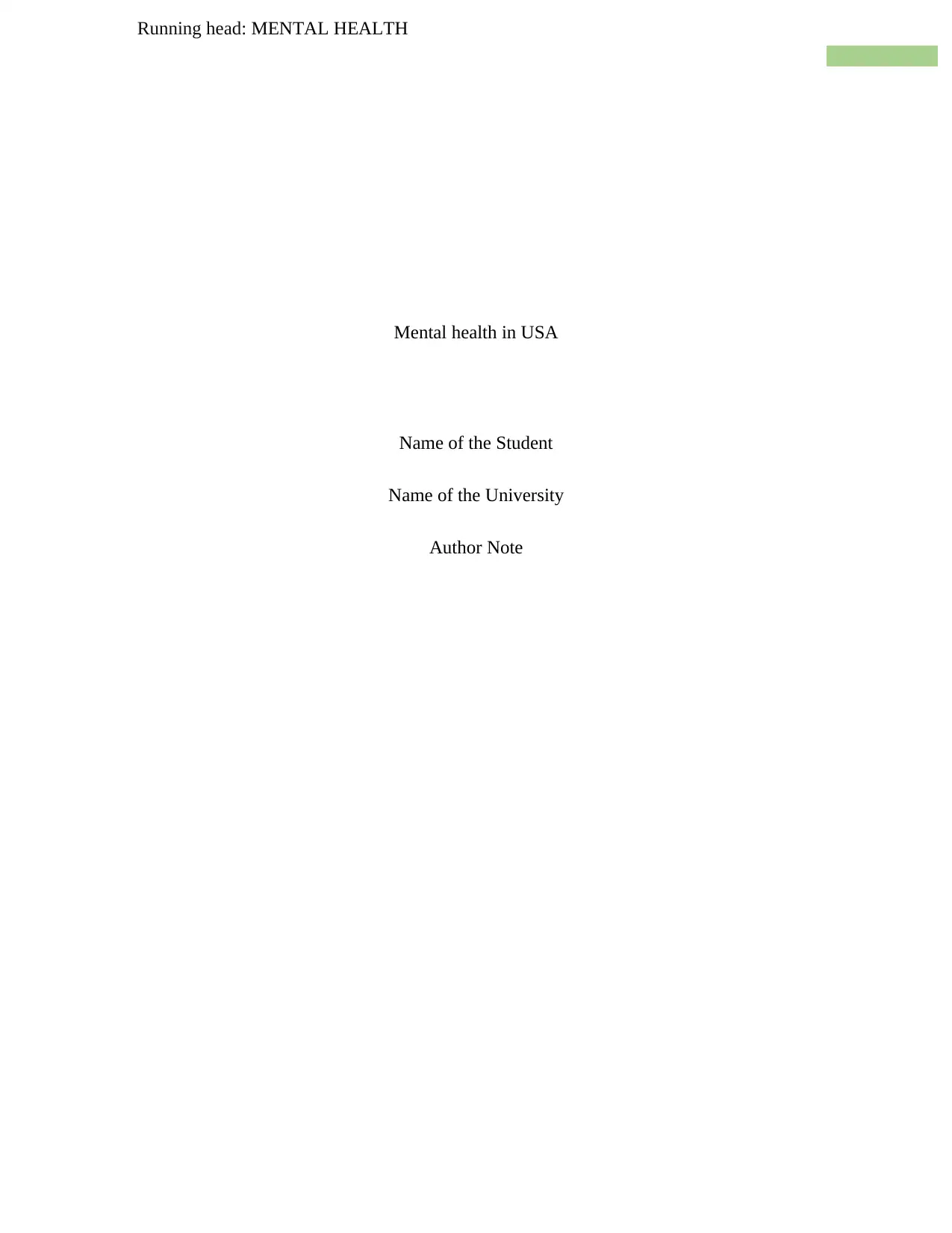
Running head: MENTAL HEALTH
Mental health in USA
Name of the Student
Name of the University
Author Note
Mental health in USA
Name of the Student
Name of the University
Author Note
Paraphrase This Document
Need a fresh take? Get an instant paraphrase of this document with our AI Paraphraser
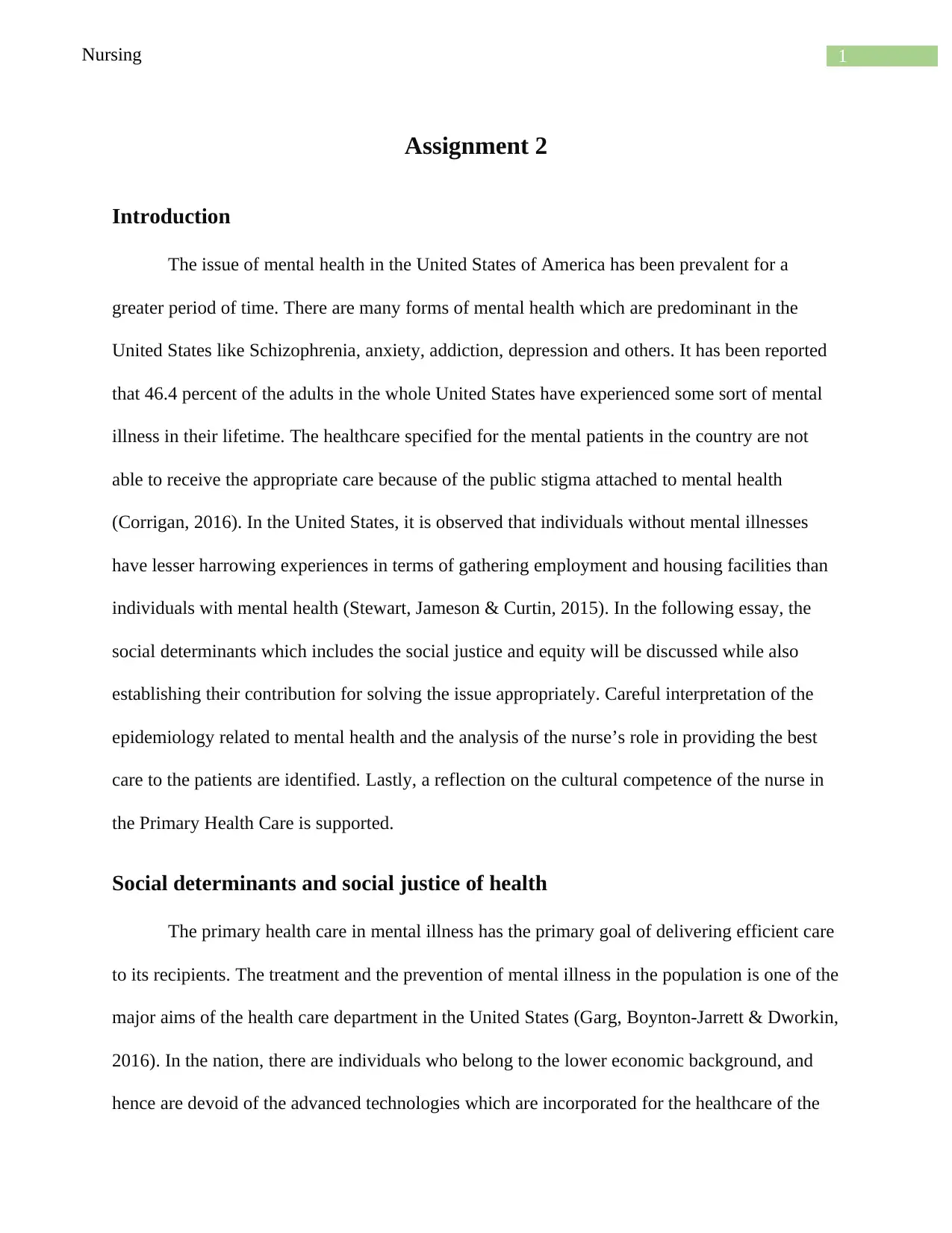
1Nursing
Assignment 2
Introduction
The issue of mental health in the United States of America has been prevalent for a
greater period of time. There are many forms of mental health which are predominant in the
United States like Schizophrenia, anxiety, addiction, depression and others. It has been reported
that 46.4 percent of the adults in the whole United States have experienced some sort of mental
illness in their lifetime. The healthcare specified for the mental patients in the country are not
able to receive the appropriate care because of the public stigma attached to mental health
(Corrigan, 2016). In the United States, it is observed that individuals without mental illnesses
have lesser harrowing experiences in terms of gathering employment and housing facilities than
individuals with mental health (Stewart, Jameson & Curtin, 2015). In the following essay, the
social determinants which includes the social justice and equity will be discussed while also
establishing their contribution for solving the issue appropriately. Careful interpretation of the
epidemiology related to mental health and the analysis of the nurse’s role in providing the best
care to the patients are identified. Lastly, a reflection on the cultural competence of the nurse in
the Primary Health Care is supported.
Social determinants and social justice of health
The primary health care in mental illness has the primary goal of delivering efficient care
to its recipients. The treatment and the prevention of mental illness in the population is one of the
major aims of the health care department in the United States (Garg, Boynton-Jarrett & Dworkin,
2016). In the nation, there are individuals who belong to the lower economic background, and
hence are devoid of the advanced technologies which are incorporated for the healthcare of the
Assignment 2
Introduction
The issue of mental health in the United States of America has been prevalent for a
greater period of time. There are many forms of mental health which are predominant in the
United States like Schizophrenia, anxiety, addiction, depression and others. It has been reported
that 46.4 percent of the adults in the whole United States have experienced some sort of mental
illness in their lifetime. The healthcare specified for the mental patients in the country are not
able to receive the appropriate care because of the public stigma attached to mental health
(Corrigan, 2016). In the United States, it is observed that individuals without mental illnesses
have lesser harrowing experiences in terms of gathering employment and housing facilities than
individuals with mental health (Stewart, Jameson & Curtin, 2015). In the following essay, the
social determinants which includes the social justice and equity will be discussed while also
establishing their contribution for solving the issue appropriately. Careful interpretation of the
epidemiology related to mental health and the analysis of the nurse’s role in providing the best
care to the patients are identified. Lastly, a reflection on the cultural competence of the nurse in
the Primary Health Care is supported.
Social determinants and social justice of health
The primary health care in mental illness has the primary goal of delivering efficient care
to its recipients. The treatment and the prevention of mental illness in the population is one of the
major aims of the health care department in the United States (Garg, Boynton-Jarrett & Dworkin,
2016). In the nation, there are individuals who belong to the lower economic background, and
hence are devoid of the advanced technologies which are incorporated for the healthcare of the
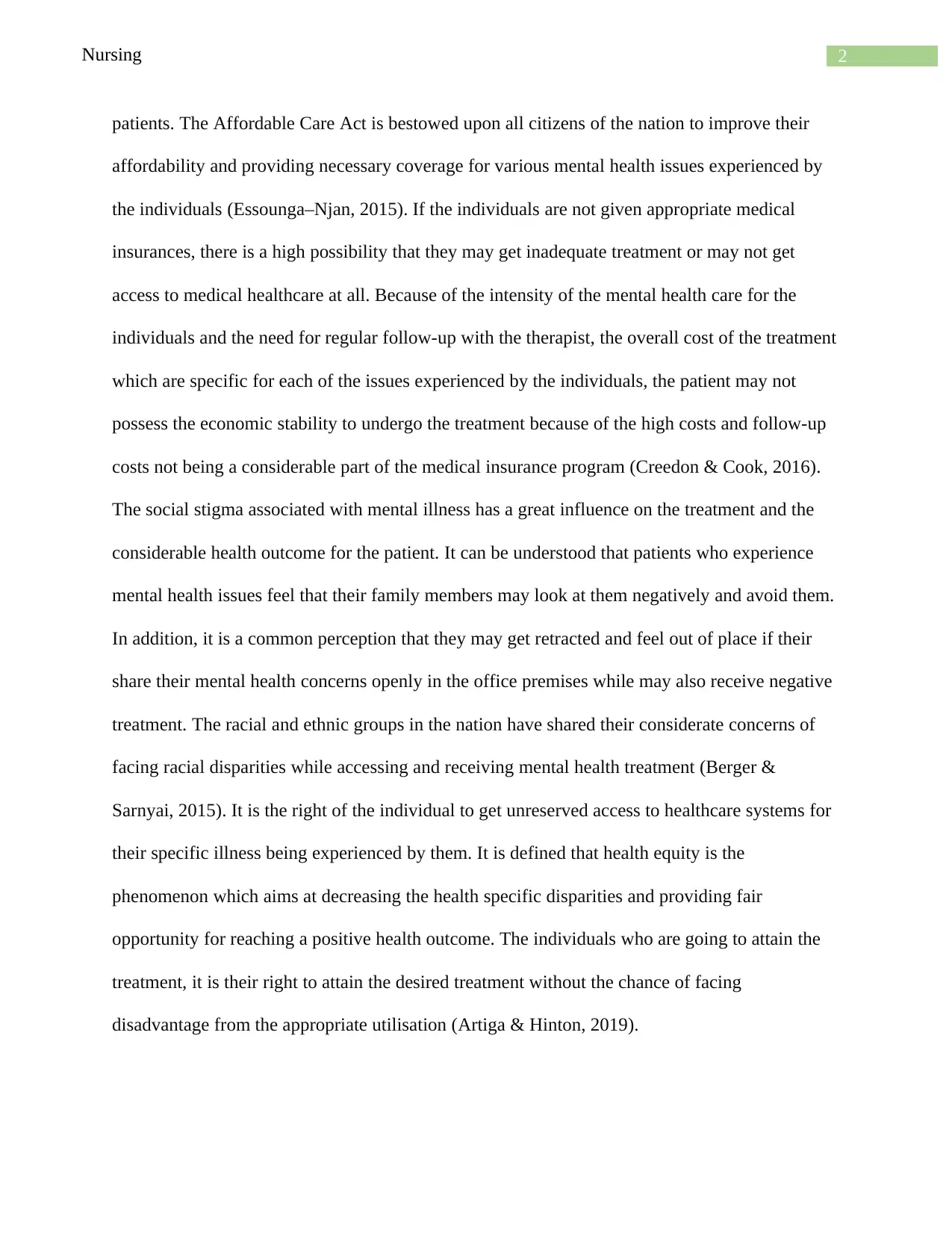
2Nursing
patients. The Affordable Care Act is bestowed upon all citizens of the nation to improve their
affordability and providing necessary coverage for various mental health issues experienced by
the individuals (Essounga–Njan, 2015). If the individuals are not given appropriate medical
insurances, there is a high possibility that they may get inadequate treatment or may not get
access to medical healthcare at all. Because of the intensity of the mental health care for the
individuals and the need for regular follow-up with the therapist, the overall cost of the treatment
which are specific for each of the issues experienced by the individuals, the patient may not
possess the economic stability to undergo the treatment because of the high costs and follow-up
costs not being a considerable part of the medical insurance program (Creedon & Cook, 2016).
The social stigma associated with mental illness has a great influence on the treatment and the
considerable health outcome for the patient. It can be understood that patients who experience
mental health issues feel that their family members may look at them negatively and avoid them.
In addition, it is a common perception that they may get retracted and feel out of place if their
share their mental health concerns openly in the office premises while may also receive negative
treatment. The racial and ethnic groups in the nation have shared their considerate concerns of
facing racial disparities while accessing and receiving mental health treatment (Berger &
Sarnyai, 2015). It is the right of the individual to get unreserved access to healthcare systems for
their specific illness being experienced by them. It is defined that health equity is the
phenomenon which aims at decreasing the health specific disparities and providing fair
opportunity for reaching a positive health outcome. The individuals who are going to attain the
treatment, it is their right to attain the desired treatment without the chance of facing
disadvantage from the appropriate utilisation (Artiga & Hinton, 2019).
patients. The Affordable Care Act is bestowed upon all citizens of the nation to improve their
affordability and providing necessary coverage for various mental health issues experienced by
the individuals (Essounga–Njan, 2015). If the individuals are not given appropriate medical
insurances, there is a high possibility that they may get inadequate treatment or may not get
access to medical healthcare at all. Because of the intensity of the mental health care for the
individuals and the need for regular follow-up with the therapist, the overall cost of the treatment
which are specific for each of the issues experienced by the individuals, the patient may not
possess the economic stability to undergo the treatment because of the high costs and follow-up
costs not being a considerable part of the medical insurance program (Creedon & Cook, 2016).
The social stigma associated with mental illness has a great influence on the treatment and the
considerable health outcome for the patient. It can be understood that patients who experience
mental health issues feel that their family members may look at them negatively and avoid them.
In addition, it is a common perception that they may get retracted and feel out of place if their
share their mental health concerns openly in the office premises while may also receive negative
treatment. The racial and ethnic groups in the nation have shared their considerate concerns of
facing racial disparities while accessing and receiving mental health treatment (Berger &
Sarnyai, 2015). It is the right of the individual to get unreserved access to healthcare systems for
their specific illness being experienced by them. It is defined that health equity is the
phenomenon which aims at decreasing the health specific disparities and providing fair
opportunity for reaching a positive health outcome. The individuals who are going to attain the
treatment, it is their right to attain the desired treatment without the chance of facing
disadvantage from the appropriate utilisation (Artiga & Hinton, 2019).
⊘ This is a preview!⊘
Do you want full access?
Subscribe today to unlock all pages.

Trusted by 1+ million students worldwide
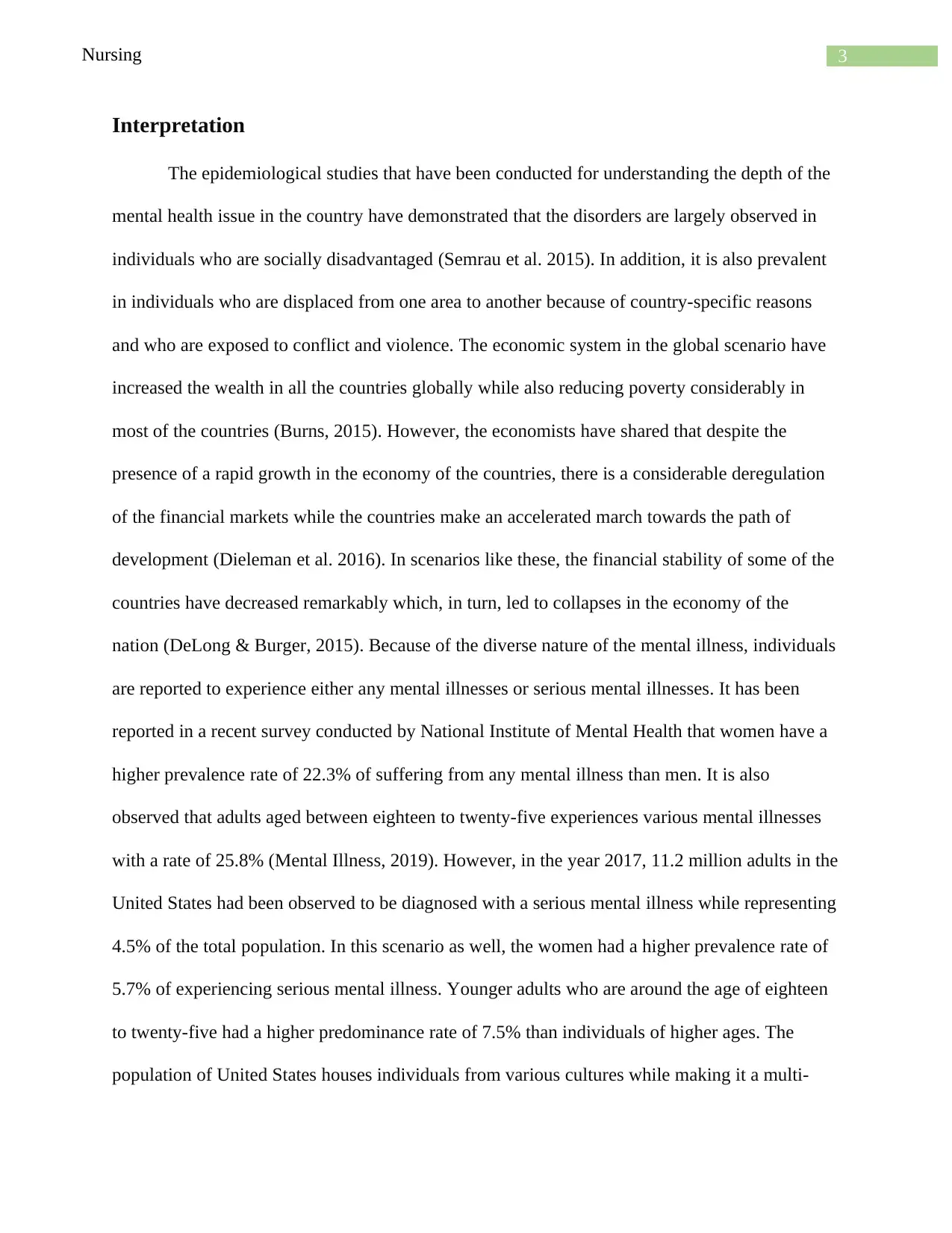
3Nursing
Interpretation
The epidemiological studies that have been conducted for understanding the depth of the
mental health issue in the country have demonstrated that the disorders are largely observed in
individuals who are socially disadvantaged (Semrau et al. 2015). In addition, it is also prevalent
in individuals who are displaced from one area to another because of country-specific reasons
and who are exposed to conflict and violence. The economic system in the global scenario have
increased the wealth in all the countries globally while also reducing poverty considerably in
most of the countries (Burns, 2015). However, the economists have shared that despite the
presence of a rapid growth in the economy of the countries, there is a considerable deregulation
of the financial markets while the countries make an accelerated march towards the path of
development (Dieleman et al. 2016). In scenarios like these, the financial stability of some of the
countries have decreased remarkably which, in turn, led to collapses in the economy of the
nation (DeLong & Burger, 2015). Because of the diverse nature of the mental illness, individuals
are reported to experience either any mental illnesses or serious mental illnesses. It has been
reported in a recent survey conducted by National Institute of Mental Health that women have a
higher prevalence rate of 22.3% of suffering from any mental illness than men. It is also
observed that adults aged between eighteen to twenty-five experiences various mental illnesses
with a rate of 25.8% (Mental Illness, 2019). However, in the year 2017, 11.2 million adults in the
United States had been observed to be diagnosed with a serious mental illness while representing
4.5% of the total population. In this scenario as well, the women had a higher prevalence rate of
5.7% of experiencing serious mental illness. Younger adults who are around the age of eighteen
to twenty-five had a higher predominance rate of 7.5% than individuals of higher ages. The
population of United States houses individuals from various cultures while making it a multi-
Interpretation
The epidemiological studies that have been conducted for understanding the depth of the
mental health issue in the country have demonstrated that the disorders are largely observed in
individuals who are socially disadvantaged (Semrau et al. 2015). In addition, it is also prevalent
in individuals who are displaced from one area to another because of country-specific reasons
and who are exposed to conflict and violence. The economic system in the global scenario have
increased the wealth in all the countries globally while also reducing poverty considerably in
most of the countries (Burns, 2015). However, the economists have shared that despite the
presence of a rapid growth in the economy of the countries, there is a considerable deregulation
of the financial markets while the countries make an accelerated march towards the path of
development (Dieleman et al. 2016). In scenarios like these, the financial stability of some of the
countries have decreased remarkably which, in turn, led to collapses in the economy of the
nation (DeLong & Burger, 2015). Because of the diverse nature of the mental illness, individuals
are reported to experience either any mental illnesses or serious mental illnesses. It has been
reported in a recent survey conducted by National Institute of Mental Health that women have a
higher prevalence rate of 22.3% of suffering from any mental illness than men. It is also
observed that adults aged between eighteen to twenty-five experiences various mental illnesses
with a rate of 25.8% (Mental Illness, 2019). However, in the year 2017, 11.2 million adults in the
United States had been observed to be diagnosed with a serious mental illness while representing
4.5% of the total population. In this scenario as well, the women had a higher prevalence rate of
5.7% of experiencing serious mental illness. Younger adults who are around the age of eighteen
to twenty-five had a higher predominance rate of 7.5% than individuals of higher ages. The
population of United States houses individuals from various cultures while making it a multi-
Paraphrase This Document
Need a fresh take? Get an instant paraphrase of this document with our AI Paraphraser
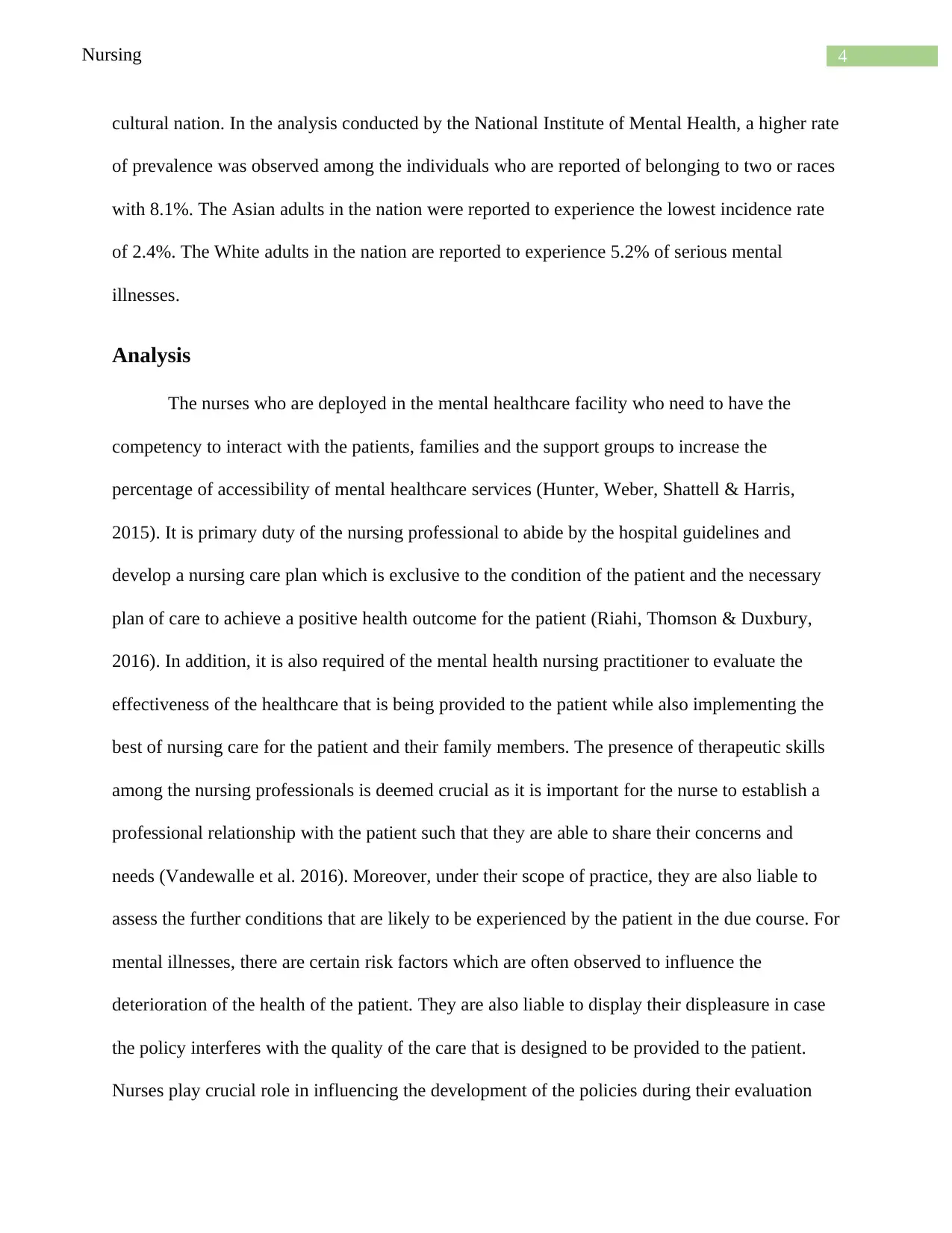
4Nursing
cultural nation. In the analysis conducted by the National Institute of Mental Health, a higher rate
of prevalence was observed among the individuals who are reported of belonging to two or races
with 8.1%. The Asian adults in the nation were reported to experience the lowest incidence rate
of 2.4%. The White adults in the nation are reported to experience 5.2% of serious mental
illnesses.
Analysis
The nurses who are deployed in the mental healthcare facility who need to have the
competency to interact with the patients, families and the support groups to increase the
percentage of accessibility of mental healthcare services (Hunter, Weber, Shattell & Harris,
2015). It is primary duty of the nursing professional to abide by the hospital guidelines and
develop a nursing care plan which is exclusive to the condition of the patient and the necessary
plan of care to achieve a positive health outcome for the patient (Riahi, Thomson & Duxbury,
2016). In addition, it is also required of the mental health nursing practitioner to evaluate the
effectiveness of the healthcare that is being provided to the patient while also implementing the
best of nursing care for the patient and their family members. The presence of therapeutic skills
among the nursing professionals is deemed crucial as it is important for the nurse to establish a
professional relationship with the patient such that they are able to share their concerns and
needs (Vandewalle et al. 2016). Moreover, under their scope of practice, they are also liable to
assess the further conditions that are likely to be experienced by the patient in the due course. For
mental illnesses, there are certain risk factors which are often observed to influence the
deterioration of the health of the patient. They are also liable to display their displeasure in case
the policy interferes with the quality of the care that is designed to be provided to the patient.
Nurses play crucial role in influencing the development of the policies during their evaluation
cultural nation. In the analysis conducted by the National Institute of Mental Health, a higher rate
of prevalence was observed among the individuals who are reported of belonging to two or races
with 8.1%. The Asian adults in the nation were reported to experience the lowest incidence rate
of 2.4%. The White adults in the nation are reported to experience 5.2% of serious mental
illnesses.
Analysis
The nurses who are deployed in the mental healthcare facility who need to have the
competency to interact with the patients, families and the support groups to increase the
percentage of accessibility of mental healthcare services (Hunter, Weber, Shattell & Harris,
2015). It is primary duty of the nursing professional to abide by the hospital guidelines and
develop a nursing care plan which is exclusive to the condition of the patient and the necessary
plan of care to achieve a positive health outcome for the patient (Riahi, Thomson & Duxbury,
2016). In addition, it is also required of the mental health nursing practitioner to evaluate the
effectiveness of the healthcare that is being provided to the patient while also implementing the
best of nursing care for the patient and their family members. The presence of therapeutic skills
among the nursing professionals is deemed crucial as it is important for the nurse to establish a
professional relationship with the patient such that they are able to share their concerns and
needs (Vandewalle et al. 2016). Moreover, under their scope of practice, they are also liable to
assess the further conditions that are likely to be experienced by the patient in the due course. For
mental illnesses, there are certain risk factors which are often observed to influence the
deterioration of the health of the patient. They are also liable to display their displeasure in case
the policy interferes with the quality of the care that is designed to be provided to the patient.
Nurses play crucial role in influencing the development of the policies during their evaluation
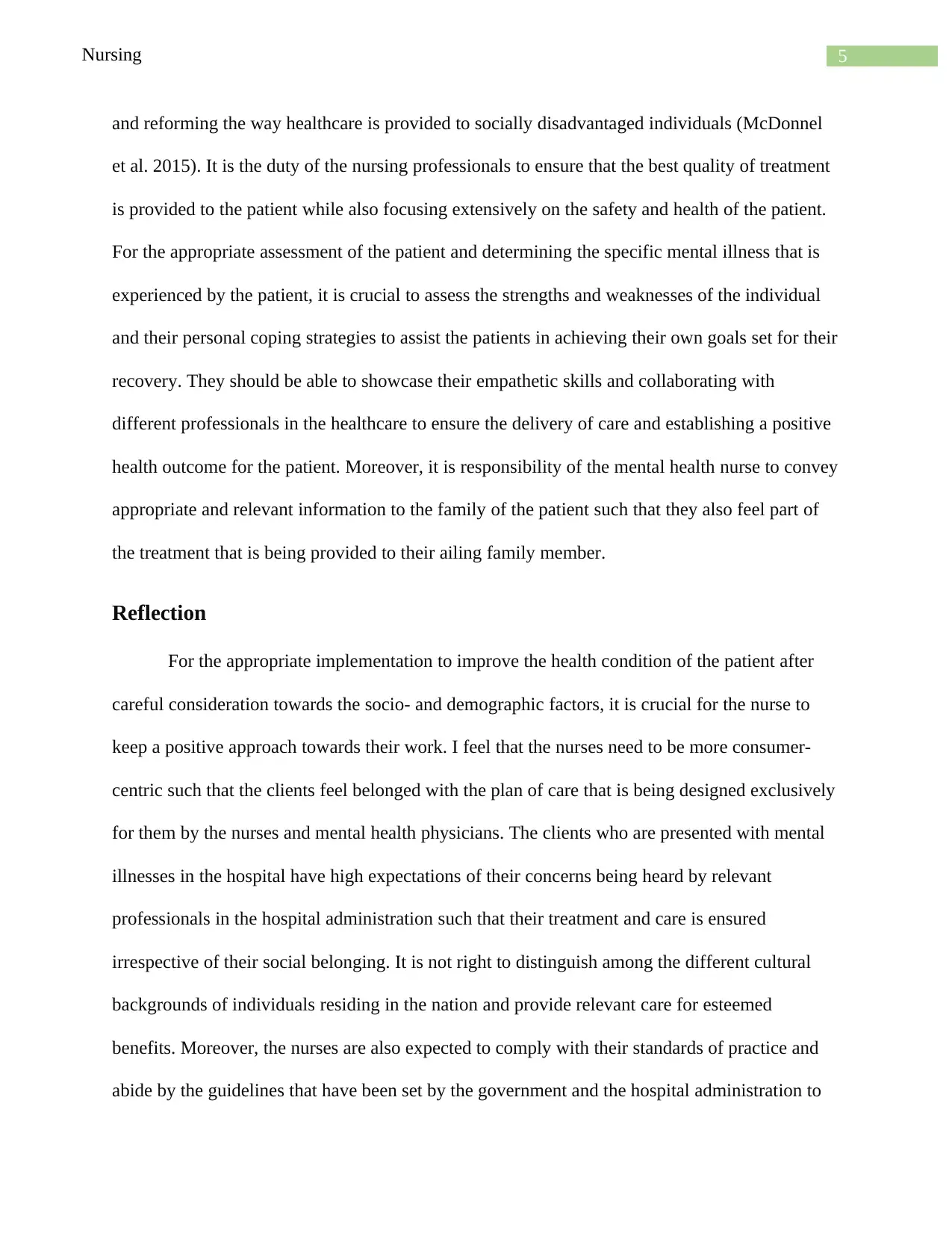
5Nursing
and reforming the way healthcare is provided to socially disadvantaged individuals (McDonnel
et al. 2015). It is the duty of the nursing professionals to ensure that the best quality of treatment
is provided to the patient while also focusing extensively on the safety and health of the patient.
For the appropriate assessment of the patient and determining the specific mental illness that is
experienced by the patient, it is crucial to assess the strengths and weaknesses of the individual
and their personal coping strategies to assist the patients in achieving their own goals set for their
recovery. They should be able to showcase their empathetic skills and collaborating with
different professionals in the healthcare to ensure the delivery of care and establishing a positive
health outcome for the patient. Moreover, it is responsibility of the mental health nurse to convey
appropriate and relevant information to the family of the patient such that they also feel part of
the treatment that is being provided to their ailing family member.
Reflection
For the appropriate implementation to improve the health condition of the patient after
careful consideration towards the socio- and demographic factors, it is crucial for the nurse to
keep a positive approach towards their work. I feel that the nurses need to be more consumer-
centric such that the clients feel belonged with the plan of care that is being designed exclusively
for them by the nurses and mental health physicians. The clients who are presented with mental
illnesses in the hospital have high expectations of their concerns being heard by relevant
professionals in the hospital administration such that their treatment and care is ensured
irrespective of their social belonging. It is not right to distinguish among the different cultural
backgrounds of individuals residing in the nation and provide relevant care for esteemed
benefits. Moreover, the nurses are also expected to comply with their standards of practice and
abide by the guidelines that have been set by the government and the hospital administration to
and reforming the way healthcare is provided to socially disadvantaged individuals (McDonnel
et al. 2015). It is the duty of the nursing professionals to ensure that the best quality of treatment
is provided to the patient while also focusing extensively on the safety and health of the patient.
For the appropriate assessment of the patient and determining the specific mental illness that is
experienced by the patient, it is crucial to assess the strengths and weaknesses of the individual
and their personal coping strategies to assist the patients in achieving their own goals set for their
recovery. They should be able to showcase their empathetic skills and collaborating with
different professionals in the healthcare to ensure the delivery of care and establishing a positive
health outcome for the patient. Moreover, it is responsibility of the mental health nurse to convey
appropriate and relevant information to the family of the patient such that they also feel part of
the treatment that is being provided to their ailing family member.
Reflection
For the appropriate implementation to improve the health condition of the patient after
careful consideration towards the socio- and demographic factors, it is crucial for the nurse to
keep a positive approach towards their work. I feel that the nurses need to be more consumer-
centric such that the clients feel belonged with the plan of care that is being designed exclusively
for them by the nurses and mental health physicians. The clients who are presented with mental
illnesses in the hospital have high expectations of their concerns being heard by relevant
professionals in the hospital administration such that their treatment and care is ensured
irrespective of their social belonging. It is not right to distinguish among the different cultural
backgrounds of individuals residing in the nation and provide relevant care for esteemed
benefits. Moreover, the nurses are also expected to comply with their standards of practice and
abide by the guidelines that have been set by the government and the hospital administration to
⊘ This is a preview!⊘
Do you want full access?
Subscribe today to unlock all pages.

Trusted by 1+ million students worldwide
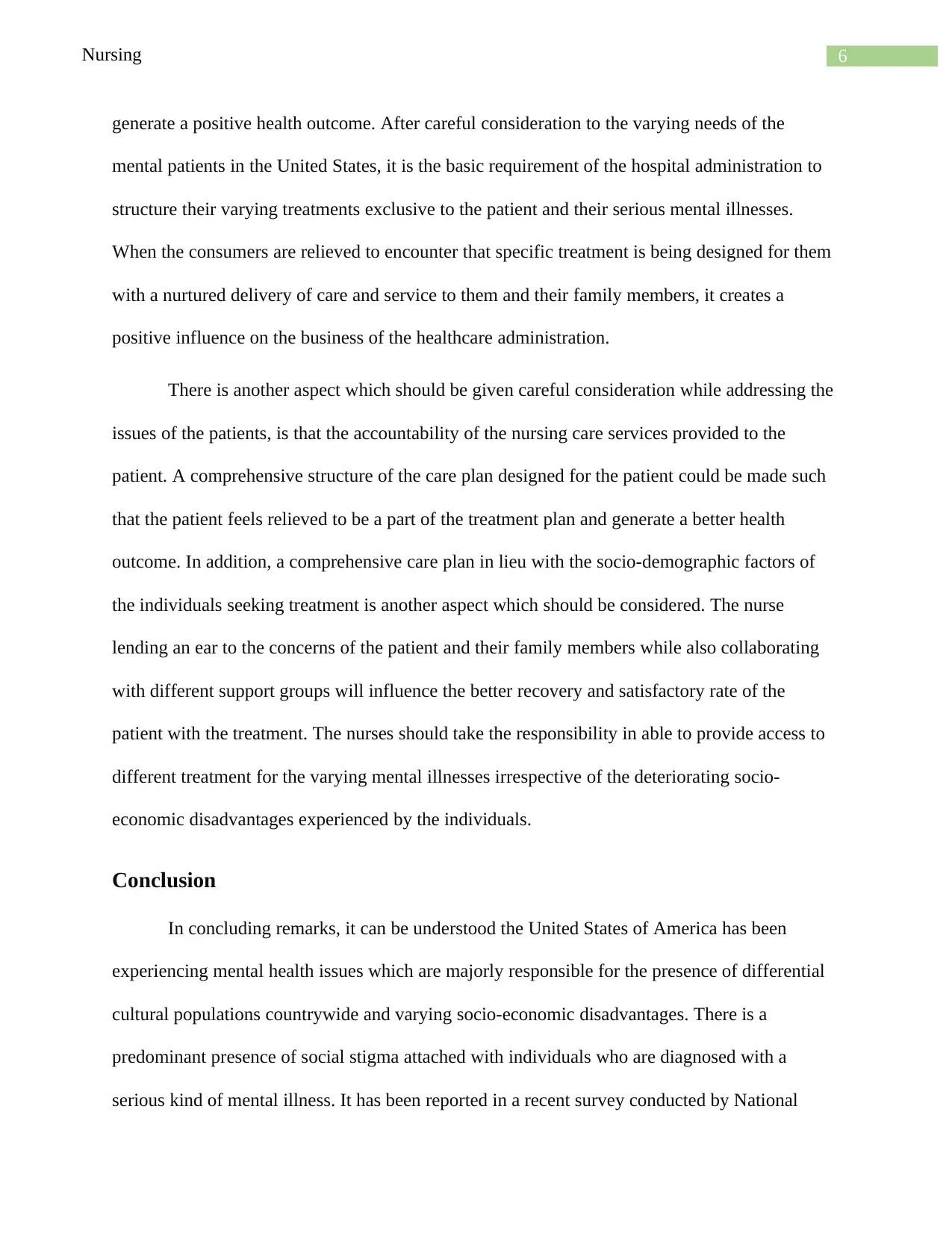
6Nursing
generate a positive health outcome. After careful consideration to the varying needs of the
mental patients in the United States, it is the basic requirement of the hospital administration to
structure their varying treatments exclusive to the patient and their serious mental illnesses.
When the consumers are relieved to encounter that specific treatment is being designed for them
with a nurtured delivery of care and service to them and their family members, it creates a
positive influence on the business of the healthcare administration.
There is another aspect which should be given careful consideration while addressing the
issues of the patients, is that the accountability of the nursing care services provided to the
patient. A comprehensive structure of the care plan designed for the patient could be made such
that the patient feels relieved to be a part of the treatment plan and generate a better health
outcome. In addition, a comprehensive care plan in lieu with the socio-demographic factors of
the individuals seeking treatment is another aspect which should be considered. The nurse
lending an ear to the concerns of the patient and their family members while also collaborating
with different support groups will influence the better recovery and satisfactory rate of the
patient with the treatment. The nurses should take the responsibility in able to provide access to
different treatment for the varying mental illnesses irrespective of the deteriorating socio-
economic disadvantages experienced by the individuals.
Conclusion
In concluding remarks, it can be understood the United States of America has been
experiencing mental health issues which are majorly responsible for the presence of differential
cultural populations countrywide and varying socio-economic disadvantages. There is a
predominant presence of social stigma attached with individuals who are diagnosed with a
serious kind of mental illness. It has been reported in a recent survey conducted by National
generate a positive health outcome. After careful consideration to the varying needs of the
mental patients in the United States, it is the basic requirement of the hospital administration to
structure their varying treatments exclusive to the patient and their serious mental illnesses.
When the consumers are relieved to encounter that specific treatment is being designed for them
with a nurtured delivery of care and service to them and their family members, it creates a
positive influence on the business of the healthcare administration.
There is another aspect which should be given careful consideration while addressing the
issues of the patients, is that the accountability of the nursing care services provided to the
patient. A comprehensive structure of the care plan designed for the patient could be made such
that the patient feels relieved to be a part of the treatment plan and generate a better health
outcome. In addition, a comprehensive care plan in lieu with the socio-demographic factors of
the individuals seeking treatment is another aspect which should be considered. The nurse
lending an ear to the concerns of the patient and their family members while also collaborating
with different support groups will influence the better recovery and satisfactory rate of the
patient with the treatment. The nurses should take the responsibility in able to provide access to
different treatment for the varying mental illnesses irrespective of the deteriorating socio-
economic disadvantages experienced by the individuals.
Conclusion
In concluding remarks, it can be understood the United States of America has been
experiencing mental health issues which are majorly responsible for the presence of differential
cultural populations countrywide and varying socio-economic disadvantages. There is a
predominant presence of social stigma attached with individuals who are diagnosed with a
serious kind of mental illness. It has been reported in a recent survey conducted by National
Paraphrase This Document
Need a fresh take? Get an instant paraphrase of this document with our AI Paraphraser
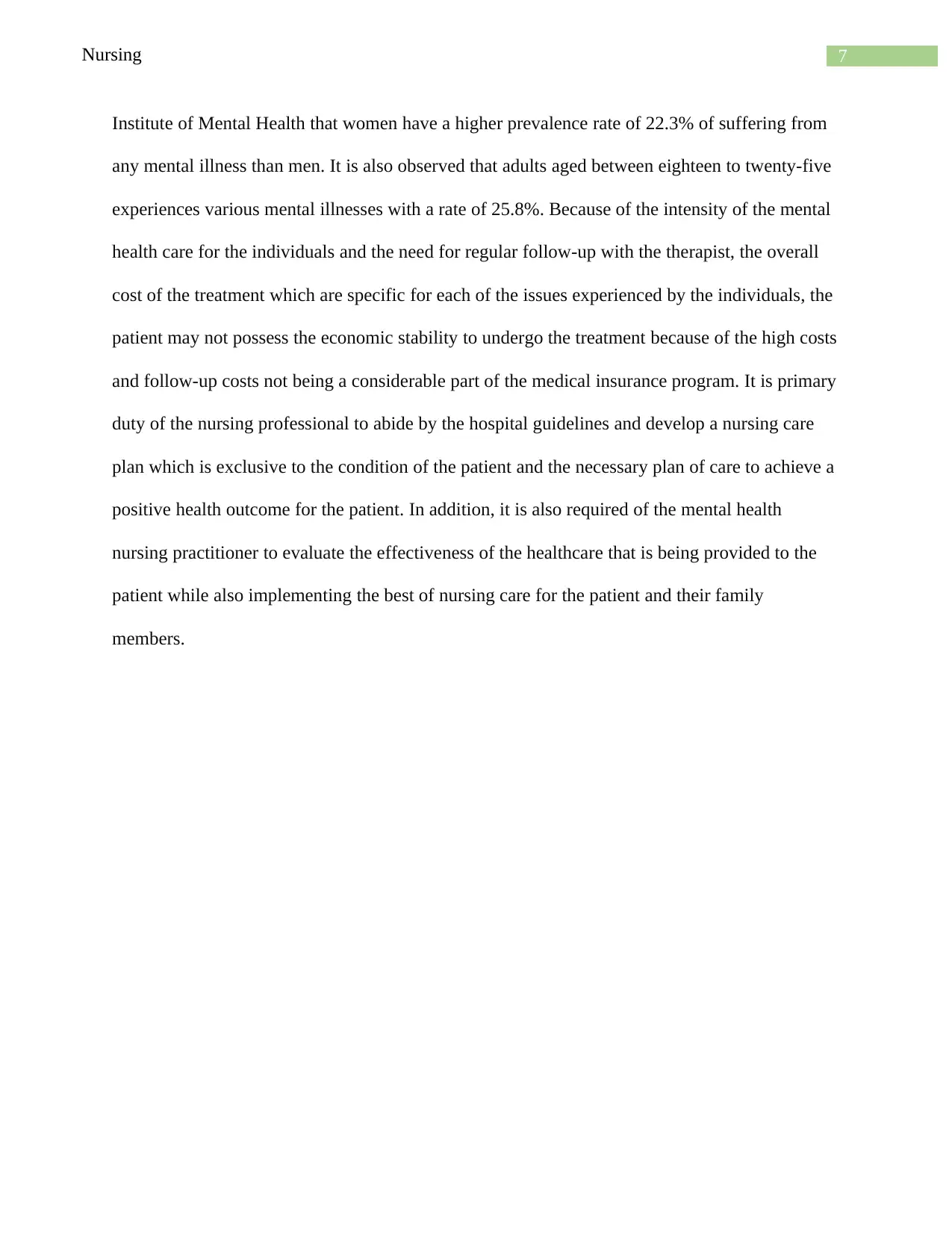
7Nursing
Institute of Mental Health that women have a higher prevalence rate of 22.3% of suffering from
any mental illness than men. It is also observed that adults aged between eighteen to twenty-five
experiences various mental illnesses with a rate of 25.8%. Because of the intensity of the mental
health care for the individuals and the need for regular follow-up with the therapist, the overall
cost of the treatment which are specific for each of the issues experienced by the individuals, the
patient may not possess the economic stability to undergo the treatment because of the high costs
and follow-up costs not being a considerable part of the medical insurance program. It is primary
duty of the nursing professional to abide by the hospital guidelines and develop a nursing care
plan which is exclusive to the condition of the patient and the necessary plan of care to achieve a
positive health outcome for the patient. In addition, it is also required of the mental health
nursing practitioner to evaluate the effectiveness of the healthcare that is being provided to the
patient while also implementing the best of nursing care for the patient and their family
members.
Institute of Mental Health that women have a higher prevalence rate of 22.3% of suffering from
any mental illness than men. It is also observed that adults aged between eighteen to twenty-five
experiences various mental illnesses with a rate of 25.8%. Because of the intensity of the mental
health care for the individuals and the need for regular follow-up with the therapist, the overall
cost of the treatment which are specific for each of the issues experienced by the individuals, the
patient may not possess the economic stability to undergo the treatment because of the high costs
and follow-up costs not being a considerable part of the medical insurance program. It is primary
duty of the nursing professional to abide by the hospital guidelines and develop a nursing care
plan which is exclusive to the condition of the patient and the necessary plan of care to achieve a
positive health outcome for the patient. In addition, it is also required of the mental health
nursing practitioner to evaluate the effectiveness of the healthcare that is being provided to the
patient while also implementing the best of nursing care for the patient and their family
members.
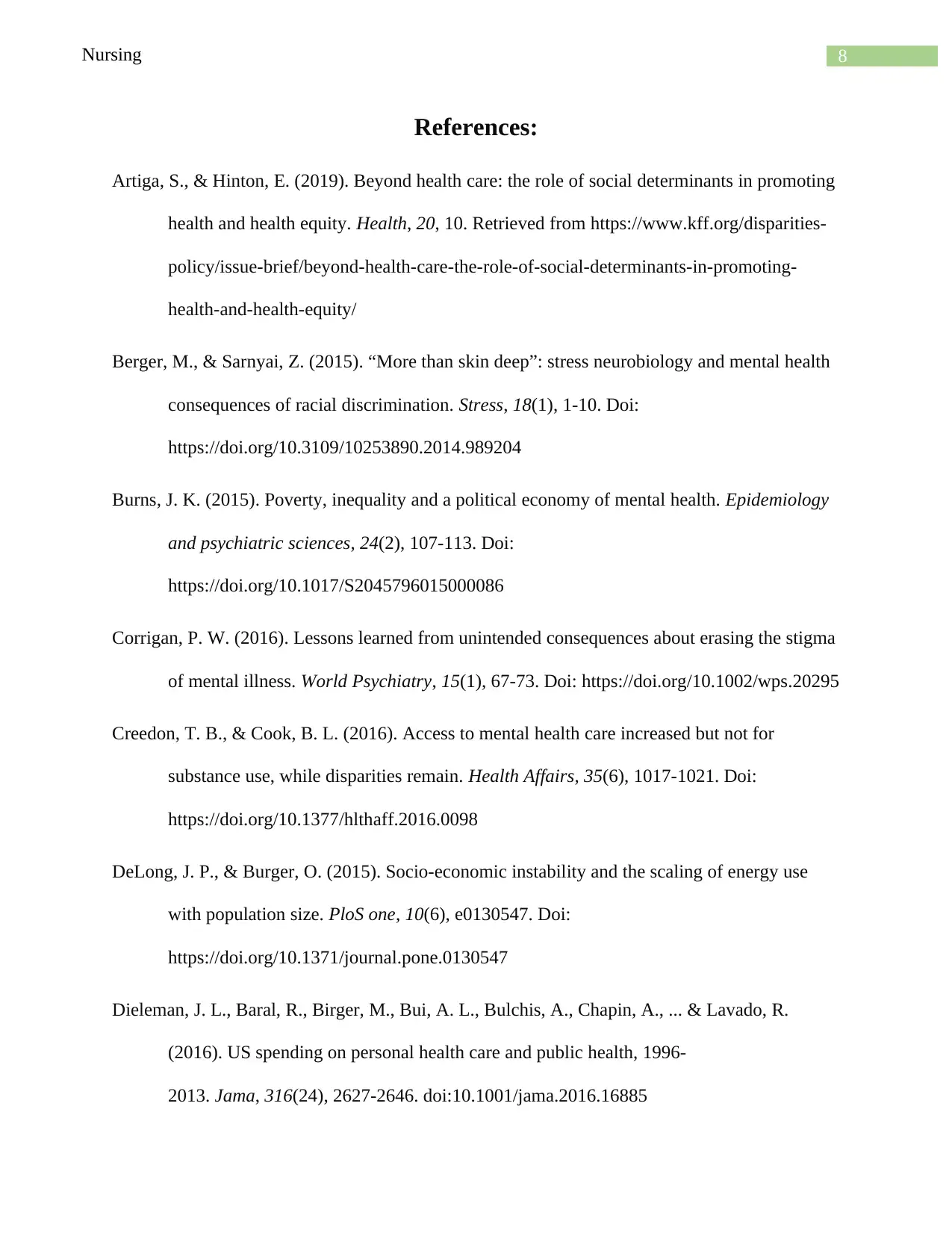
8Nursing
References:
Artiga, S., & Hinton, E. (2019). Beyond health care: the role of social determinants in promoting
health and health equity. Health, 20, 10. Retrieved from https://www.kff.org/disparities-
policy/issue-brief/beyond-health-care-the-role-of-social-determinants-in-promoting-
health-and-health-equity/
Berger, M., & Sarnyai, Z. (2015). “More than skin deep”: stress neurobiology and mental health
consequences of racial discrimination. Stress, 18(1), 1-10. Doi:
https://doi.org/10.3109/10253890.2014.989204
Burns, J. K. (2015). Poverty, inequality and a political economy of mental health. Epidemiology
and psychiatric sciences, 24(2), 107-113. Doi:
https://doi.org/10.1017/S2045796015000086
Corrigan, P. W. (2016). Lessons learned from unintended consequences about erasing the stigma
of mental illness. World Psychiatry, 15(1), 67-73. Doi: https://doi.org/10.1002/wps.20295
Creedon, T. B., & Cook, B. L. (2016). Access to mental health care increased but not for
substance use, while disparities remain. Health Affairs, 35(6), 1017-1021. Doi:
https://doi.org/10.1377/hlthaff.2016.0098
DeLong, J. P., & Burger, O. (2015). Socio-economic instability and the scaling of energy use
with population size. PloS one, 10(6), e0130547. Doi:
https://doi.org/10.1371/journal.pone.0130547
Dieleman, J. L., Baral, R., Birger, M., Bui, A. L., Bulchis, A., Chapin, A., ... & Lavado, R.
(2016). US spending on personal health care and public health, 1996-
2013. Jama, 316(24), 2627-2646. doi:10.1001/jama.2016.16885
References:
Artiga, S., & Hinton, E. (2019). Beyond health care: the role of social determinants in promoting
health and health equity. Health, 20, 10. Retrieved from https://www.kff.org/disparities-
policy/issue-brief/beyond-health-care-the-role-of-social-determinants-in-promoting-
health-and-health-equity/
Berger, M., & Sarnyai, Z. (2015). “More than skin deep”: stress neurobiology and mental health
consequences of racial discrimination. Stress, 18(1), 1-10. Doi:
https://doi.org/10.3109/10253890.2014.989204
Burns, J. K. (2015). Poverty, inequality and a political economy of mental health. Epidemiology
and psychiatric sciences, 24(2), 107-113. Doi:
https://doi.org/10.1017/S2045796015000086
Corrigan, P. W. (2016). Lessons learned from unintended consequences about erasing the stigma
of mental illness. World Psychiatry, 15(1), 67-73. Doi: https://doi.org/10.1002/wps.20295
Creedon, T. B., & Cook, B. L. (2016). Access to mental health care increased but not for
substance use, while disparities remain. Health Affairs, 35(6), 1017-1021. Doi:
https://doi.org/10.1377/hlthaff.2016.0098
DeLong, J. P., & Burger, O. (2015). Socio-economic instability and the scaling of energy use
with population size. PloS one, 10(6), e0130547. Doi:
https://doi.org/10.1371/journal.pone.0130547
Dieleman, J. L., Baral, R., Birger, M., Bui, A. L., Bulchis, A., Chapin, A., ... & Lavado, R.
(2016). US spending on personal health care and public health, 1996-
2013. Jama, 316(24), 2627-2646. doi:10.1001/jama.2016.16885
⊘ This is a preview!⊘
Do you want full access?
Subscribe today to unlock all pages.

Trusted by 1+ million students worldwide
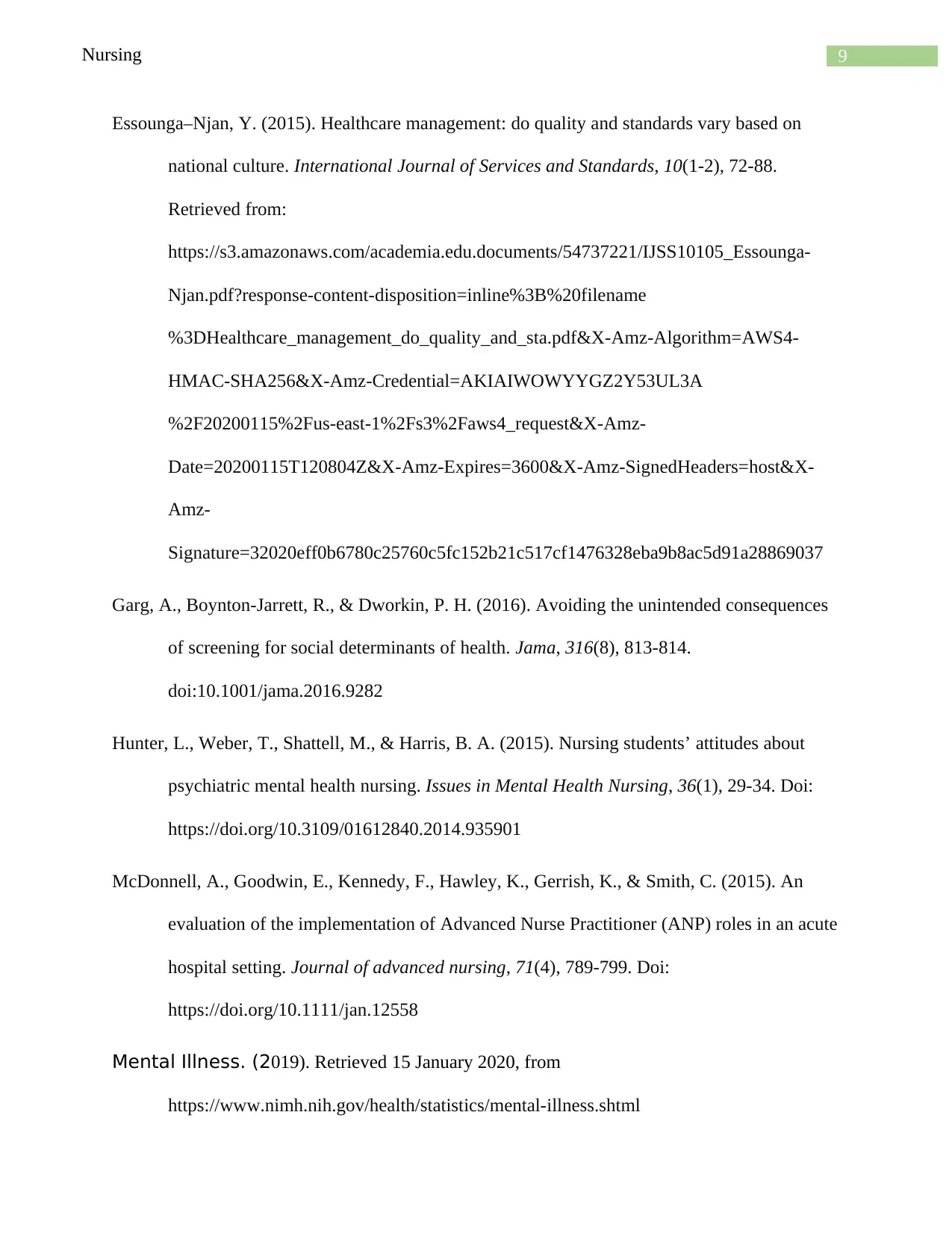
9Nursing
Essounga–Njan, Y. (2015). Healthcare management: do quality and standards vary based on
national culture. International Journal of Services and Standards, 10(1-2), 72-88.
Retrieved from:
https://s3.amazonaws.com/academia.edu.documents/54737221/IJSS10105_Essounga-
Njan.pdf?response-content-disposition=inline%3B%20filename
%3DHealthcare_management_do_quality_and_sta.pdf&X-Amz-Algorithm=AWS4-
HMAC-SHA256&X-Amz-Credential=AKIAIWOWYYGZ2Y53UL3A
%2F20200115%2Fus-east-1%2Fs3%2Faws4_request&X-Amz-
Date=20200115T120804Z&X-Amz-Expires=3600&X-Amz-SignedHeaders=host&X-
Amz-
Signature=32020eff0b6780c25760c5fc152b21c517cf1476328eba9b8ac5d91a28869037
Garg, A., Boynton-Jarrett, R., & Dworkin, P. H. (2016). Avoiding the unintended consequences
of screening for social determinants of health. Jama, 316(8), 813-814.
doi:10.1001/jama.2016.9282
Hunter, L., Weber, T., Shattell, M., & Harris, B. A. (2015). Nursing students’ attitudes about
psychiatric mental health nursing. Issues in Mental Health Nursing, 36(1), 29-34. Doi:
https://doi.org/10.3109/01612840.2014.935901
McDonnell, A., Goodwin, E., Kennedy, F., Hawley, K., Gerrish, K., & Smith, C. (2015). An
evaluation of the implementation of Advanced Nurse Practitioner (ANP) roles in an acute
hospital setting. Journal of advanced nursing, 71(4), 789-799. Doi:
https://doi.org/10.1111/jan.12558
Mental Illness. (2019). Retrieved 15 January 2020, from
https://www.nimh.nih.gov/health/statistics/mental-illness.shtml
Essounga–Njan, Y. (2015). Healthcare management: do quality and standards vary based on
national culture. International Journal of Services and Standards, 10(1-2), 72-88.
Retrieved from:
https://s3.amazonaws.com/academia.edu.documents/54737221/IJSS10105_Essounga-
Njan.pdf?response-content-disposition=inline%3B%20filename
%3DHealthcare_management_do_quality_and_sta.pdf&X-Amz-Algorithm=AWS4-
HMAC-SHA256&X-Amz-Credential=AKIAIWOWYYGZ2Y53UL3A
%2F20200115%2Fus-east-1%2Fs3%2Faws4_request&X-Amz-
Date=20200115T120804Z&X-Amz-Expires=3600&X-Amz-SignedHeaders=host&X-
Amz-
Signature=32020eff0b6780c25760c5fc152b21c517cf1476328eba9b8ac5d91a28869037
Garg, A., Boynton-Jarrett, R., & Dworkin, P. H. (2016). Avoiding the unintended consequences
of screening for social determinants of health. Jama, 316(8), 813-814.
doi:10.1001/jama.2016.9282
Hunter, L., Weber, T., Shattell, M., & Harris, B. A. (2015). Nursing students’ attitudes about
psychiatric mental health nursing. Issues in Mental Health Nursing, 36(1), 29-34. Doi:
https://doi.org/10.3109/01612840.2014.935901
McDonnell, A., Goodwin, E., Kennedy, F., Hawley, K., Gerrish, K., & Smith, C. (2015). An
evaluation of the implementation of Advanced Nurse Practitioner (ANP) roles in an acute
hospital setting. Journal of advanced nursing, 71(4), 789-799. Doi:
https://doi.org/10.1111/jan.12558
Mental Illness. (2019). Retrieved 15 January 2020, from
https://www.nimh.nih.gov/health/statistics/mental-illness.shtml
Paraphrase This Document
Need a fresh take? Get an instant paraphrase of this document with our AI Paraphraser
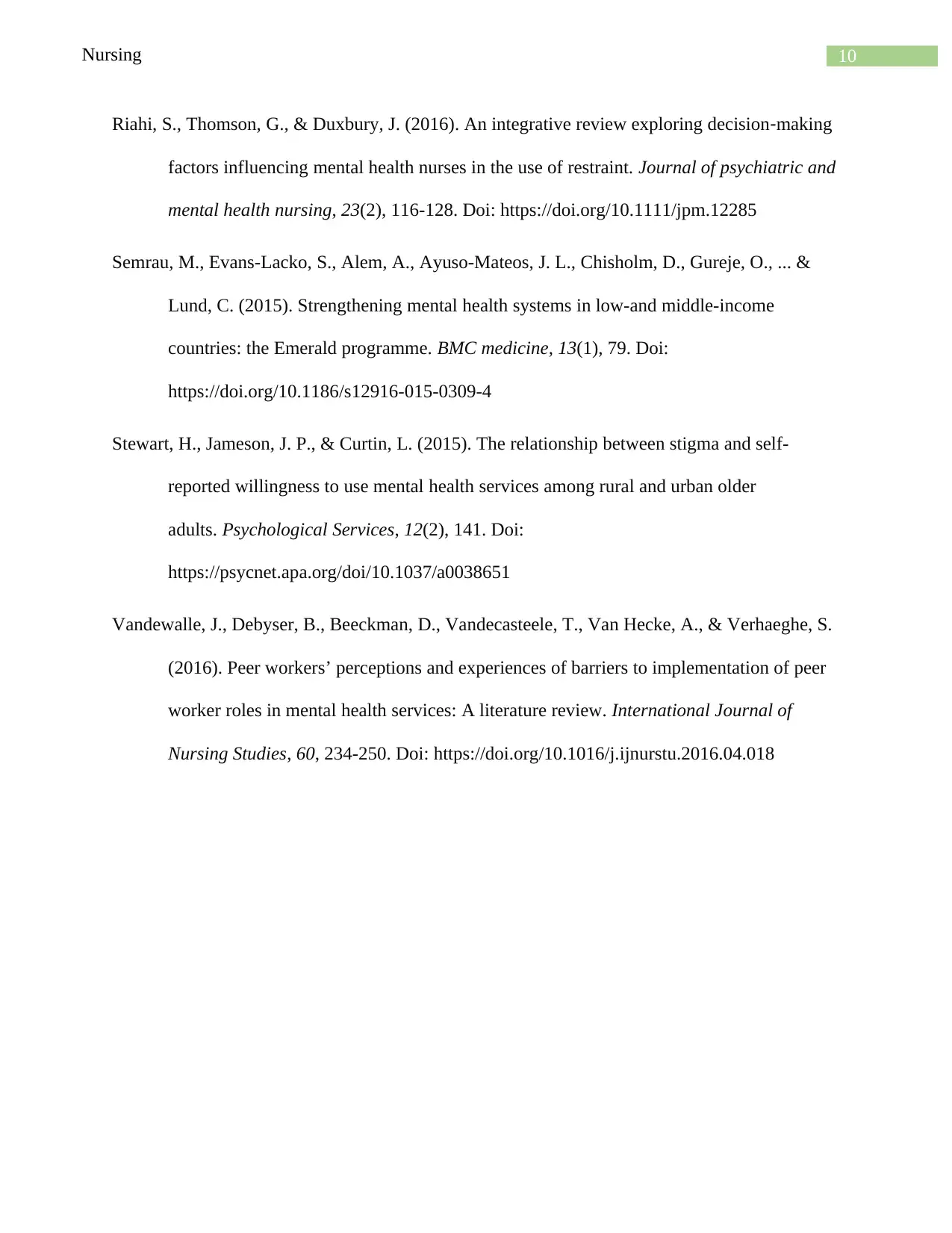
10Nursing
Riahi, S., Thomson, G., & Duxbury, J. (2016). An integrative review exploring decision‐making
factors influencing mental health nurses in the use of restraint. Journal of psychiatric and
mental health nursing, 23(2), 116-128. Doi: https://doi.org/10.1111/jpm.12285
Semrau, M., Evans-Lacko, S., Alem, A., Ayuso-Mateos, J. L., Chisholm, D., Gureje, O., ... &
Lund, C. (2015). Strengthening mental health systems in low-and middle-income
countries: the Emerald programme. BMC medicine, 13(1), 79. Doi:
https://doi.org/10.1186/s12916-015-0309-4
Stewart, H., Jameson, J. P., & Curtin, L. (2015). The relationship between stigma and self-
reported willingness to use mental health services among rural and urban older
adults. Psychological Services, 12(2), 141. Doi:
https://psycnet.apa.org/doi/10.1037/a0038651
Vandewalle, J., Debyser, B., Beeckman, D., Vandecasteele, T., Van Hecke, A., & Verhaeghe, S.
(2016). Peer workers’ perceptions and experiences of barriers to implementation of peer
worker roles in mental health services: A literature review. International Journal of
Nursing Studies, 60, 234-250. Doi: https://doi.org/10.1016/j.ijnurstu.2016.04.018
Riahi, S., Thomson, G., & Duxbury, J. (2016). An integrative review exploring decision‐making
factors influencing mental health nurses in the use of restraint. Journal of psychiatric and
mental health nursing, 23(2), 116-128. Doi: https://doi.org/10.1111/jpm.12285
Semrau, M., Evans-Lacko, S., Alem, A., Ayuso-Mateos, J. L., Chisholm, D., Gureje, O., ... &
Lund, C. (2015). Strengthening mental health systems in low-and middle-income
countries: the Emerald programme. BMC medicine, 13(1), 79. Doi:
https://doi.org/10.1186/s12916-015-0309-4
Stewart, H., Jameson, J. P., & Curtin, L. (2015). The relationship between stigma and self-
reported willingness to use mental health services among rural and urban older
adults. Psychological Services, 12(2), 141. Doi:
https://psycnet.apa.org/doi/10.1037/a0038651
Vandewalle, J., Debyser, B., Beeckman, D., Vandecasteele, T., Van Hecke, A., & Verhaeghe, S.
(2016). Peer workers’ perceptions and experiences of barriers to implementation of peer
worker roles in mental health services: A literature review. International Journal of
Nursing Studies, 60, 234-250. Doi: https://doi.org/10.1016/j.ijnurstu.2016.04.018
1 out of 11
Related Documents
Your All-in-One AI-Powered Toolkit for Academic Success.
+13062052269
info@desklib.com
Available 24*7 on WhatsApp / Email
![[object Object]](/_next/static/media/star-bottom.7253800d.svg)
Unlock your academic potential
Copyright © 2020–2026 A2Z Services. All Rights Reserved. Developed and managed by ZUCOL.





